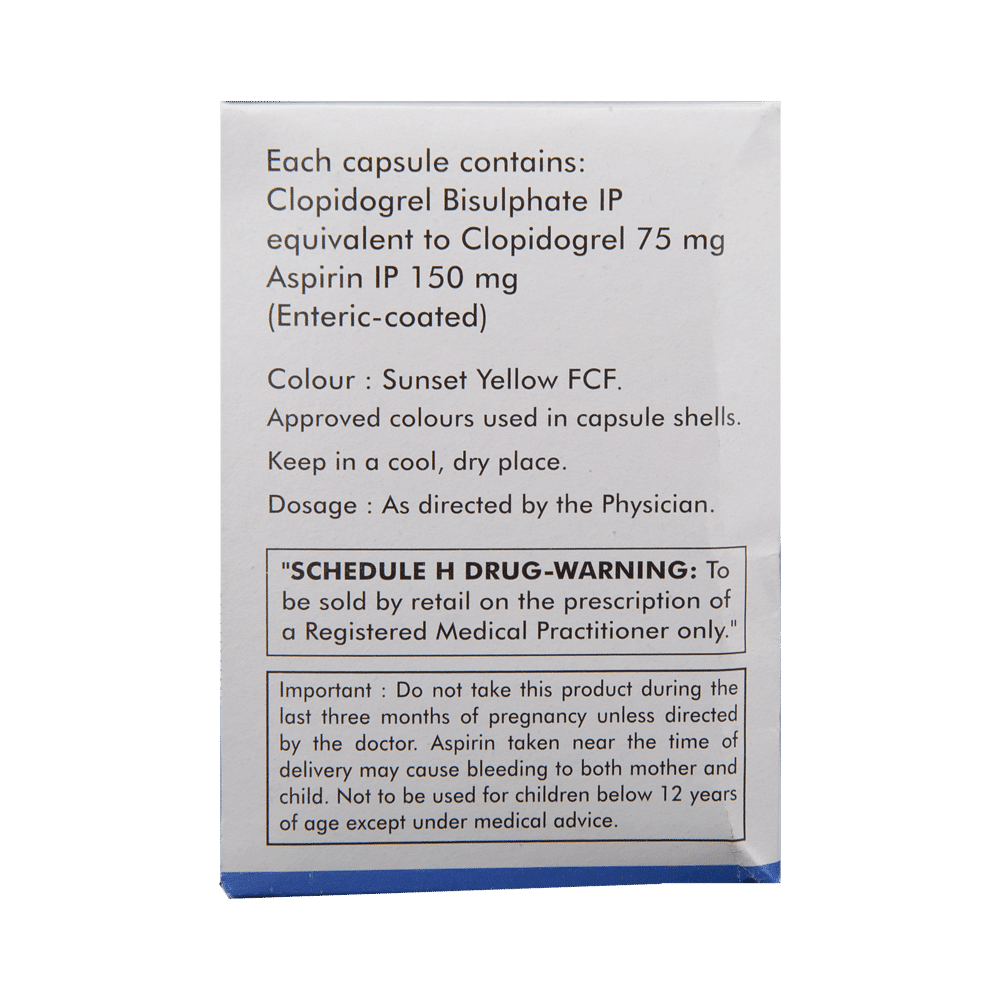
Clotinil AP 150mg/75mg Capsule
Manufacturer
Prevego Healthcare & Research Private Limited
Salt Composition
Aspirin (150mg) + Clopidogrel (75mg)
Key Information
Short Description
Clotinil AP 150mg/75mg Capsule is a combination of two antiplatelet medicines used to reduce the formation of harmful blood clots in blood vessels, preventing heart attack and stroke.
Dosage Form
Capsule
Introduction
Clotinil AP 150mg/75mg Capsule is a combination of two antiplatelet medicines or blood thinner used to reduce the formation of harmful blood clots in blood vessels. It is used to prevent a heart attack or stroke in people with heart disease. It is also used to treat acute coronary syndrome (ACS).
Directions for Use
Take this medicine in the dose and duration as advised by your doctor. Clotinil AP 150mg/75mg Capsule is to be taken with food.
How it works
Clotinil AP 150mg/75mg Capsule is a combination of two antiplatelet medicines: Aspirin and Clopidogrel which prevent heart attack. They work by preventing the platelets from sticking together and decrease the formation of harmful blood clots. It is also used to treat acute coronary syndrome (ACS).
Quick Tips
You have been prescribed Clotinil AP 150mg/75mg Capsule to lower your risk of heart attack and stroke. Take it with food to avoid an upset stomach. It increases your risk of bleeding. Be careful while shaving, cutting fingernails or toenails or using sharp objects. Let your doctor know you are taking Clotinil AP 150mg/75mg Capsule before undergoing any surgical procedure.
Related Medicines

Ceruvin AF Capsule

Plagerine-A 150 Capsule

Clopitab-A 150 Capsule

Abclopid A 150 Capsule

Thrombosprin DS Capsule

Aspidel 150 Capsule

Clasprin 150 mg/75 mg Capsule

Clopisa 150mg/75mg Capsule

Livigrel A 150mg/75mg Capsule

Clodrel Forte Capsule
Frequently asked questions
Why have I been prescribed Clotinil AP 150mg/75mg Capsule?
You may have been prescribed Clotinil AP 150mg/75mg Capsule if you had a heart attack, underwent stenting in your coronary arteries, or had a coronary artery bypass graft surgery (CABG).
Is Clotinil AP 150mg/75mg Capsule a blood thinner?
Yes, Clotinil AP 150mg/75mg Capsule is a type of blood thinner. It works by preventing platelets (type of blood cells) from sticking together and forming clots. This action of Clotinil AP 150mg/75mg Capsule helps prevent conditions like heart attack or stroke in people with heart disease, who have recently suffered a heart attack or severe heart-related chest pain (unstable angina).
How long do I need to take Clotinil AP 150mg/75mg Capsule after stent insertion?
Your doctor will determine the exact duration for which you may have to take Clotinil AP 150mg/75mg Capsule. This will be decided based on several factors, including the illness being treated, type of stent inserted, any episodes of bleeding experienced during treatment, and other individual considerations. Usually, Clotinil AP 150mg/75mg Capsule is prescribed for at least one year; however, following your doctor's advice precisely is crucial to maximizing the benefits of Clotinil AP 150mg/75mg Capsule. Do not stop taking the medication on your own; consult your doctor before discontinuing treatment.
Can I drink alcohol while taking Clotinil AP 150mg/75mg Capsule?
It is not advised to consume alcohol when taking Clotinil AP 150mg/75mg Capsule, as alcohol may increase the risk of stomach bleeding. As a result, you may experience vomiting blood (which can range from bright red to black or dark brown like coffee grounds) or have bloody or black tarry stools. Discuss with your doctor if you are unsure.
What is the most important information I need to know about Clotinil AP 150mg/75mg Capsule?
Clotinil AP 150mg/75mg Capsule can cause serious side effects, and you should discuss any concerns with your doctor. It's crucial to understand the potential risks: - Clotinil AP 150mg/75mg Capsule may increase bleeding risk, which could require careful monitoring. - Stomach ulcers are a possible side effect, so it is essential to communicate any signs of pain or discomfort to your doctor immediately. - It's important to follow the prescribed dosage and avoid activities that could increase bleeding risk. - Always seek professional medical advice regarding medication use and potential risks.
Who should not take Clotinil AP 150mg/75mg Capsule?
Clotinil AP 150mg/75mg Capsule is not recommended for individuals with allergies to it or any of its ingredients. Do not take Clotinil AP 150mg/75mg Capsule if you have or ever had severe liver disease, stomach ulcers, bleeding in the brain (stroke or a transient ischemic attack, also known as TIA), or a bleeding disorder called hemophilia. Additionally, avoid taking Clotinil AP 150mg/75mg Capsule if you are trying to get pregnant, are already pregnant, or breastfeeding.
What if I forget to take a dose of Clotinil AP 150mg/75mg Capsule?
If you miss a dose of Clotinil AP 150mg/75mg Capsule, take it as soon as you remember. However, if it's almost time for your next dose, skip the missed dose and take the scheduled one at the right time.
What should I avoid while taking Clotinil AP 150mg/75mg Capsule?
Be cautious of activities that may increase your risk of bleeding. Be especially careful when shaving or brushing your teeth to prevent bleeding. Also, consult your doctor before taking painkillers like ibuprofen for joint pain, headache, or backache.


